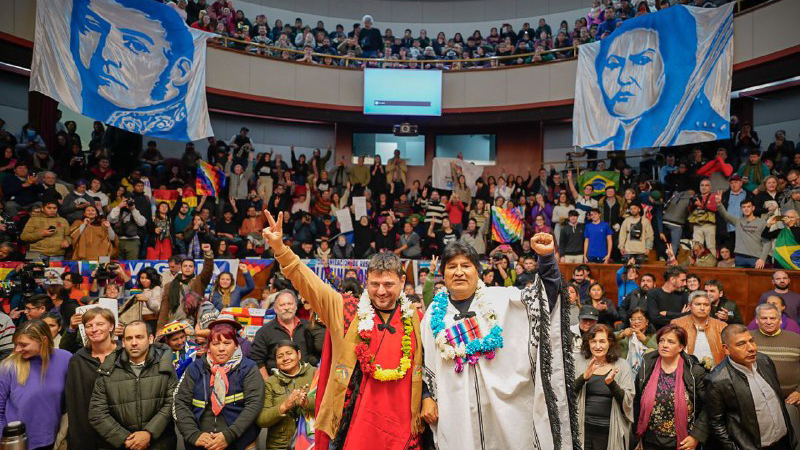The pre-candidate for president of Unión por la Patria Juan Grabois, and the former president of Bolivia, Evo Morales, held an event where they spoke about strategic resources for the region and the electoral context. “By heritage, by history, we are anti-colonialist and therefore anti-imperialist,” affirmed Evo.
After the presentation of the national deputy for the Frente Patria Grande Natalia Zaracho, Grabois talked about Evo Morales’ administration and stated: “What we want to do from our candidacy is not very different from what Evo Morales did in Bolivia” and added: “It is the strategic control of natural resources, the land, roof and work policy that we spoke about with the Pope, an agrarian reform, an urban reform and a plurality in the labor system so that cooperativists, the private sector and the public sector with reasonable labor rights can be present.”
He also remarked on the “political revolution” that implies that in the Plurinational Assembly “the excluded will enter.” “This is what we need in all Latin America,” he assured.
Meanwhile, Evo Morales highlighted his program in 2005 and claimed: “Politically, the re-foundation; economically, the nationalization; and socially, the redistribution of wealth” and then commented on his experience when Juntos por el Cambio was governing Argentina: “Macri asked me ‘Evo, how much is going to be the growth this year?’ ‘5%,’ ‘What must be done to do that?’ ‘Nationalize natural resources.'” They also discussed the last coup in Bolivia and Grabois affirmed: “That coup smelled of lithium. It smelled of FTAA [Free Trade Area of the Americas], but not the one we defeated in 2005. The new FTAA, which has to do with water, lithium, fuels and food. Why did they overthrow Evo? Because he recovered water and got the UN to consider it a basic human right.” Grabois also remarked on the complicity of Gerardo Morales with said coup in the shipment of weapons.
“The lithium issue should not be a left or right wing policy, but a State policy,” said Evo, who added, “Our task is to establish economic sovereignty for Argentina. If there were unity between Bolivia, Argentina, and Chile and lithium were in the hands of the states, we would be a world power.”
In relation to the situation with the IMF, Morales recalled his experience, “In the Central Bank of Bolivia the [IMF] had its office,” and his response: “CIA out of the Palace, IMF out of the Central Bank of Bolivia.” He also positioned himself before the electoral scenario and assured: “In the elections, we are once again facing those who are the privatizers and those who are the nationalizers. We, the nationalizers, are going to continue winning massively.” Finally, the former Bolivian president agreed with Grabois, “By heritage, by history, we are anti-colonialists and therefore anti-imperialists. We do not just talk for the sake of talking, but we have done and demonstrated.”
This article was written by Juan Manuel Erazo and originally published in Spanish in ARG Medios.





